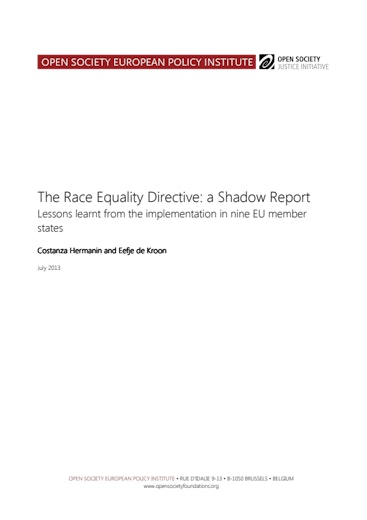Making “Big Data” Work for Equality
By Costanza Hermanin & Angelina Atanasova
As the recent PRISM program scandal in the United States highlighted, corporations and governments can gather information of any kind about us. Your emails, the foods you like, where you travel, and your shopping preferences are all examples of personal data that can be mined for profiling purposes.
It’s ironic, then, that when discussing ethnic minorities or people with disabilities in Europe, “no data available” is a common excuse for not doing more to fight discrimination and inequality.
The Open Society Foundations have grappled with this excuse far too frequently in our grantmaking, advocacy, and litigation work. In 2013, we launched the Equality Data Initiative, which aims to compel European states to collect information such as employment situation, educational achievement, and housing distribution for groups at risk of discrimination. The pilot phase focuses on education in Bulgaria, Germany, Hungary, Ireland, Romania, and Sweden, and on public employment in France.
The collection of precise data on inequality is an essential element in identifying gaps in public policies, and implementing remedial steps. Lack of data masks inequalities and hinders the exposure and monitoring of these gaps by civil society. Government assertions about how well they are doing in closing the gaps cannot be verified.
Such benefits of collecting data on groups at risk of discrimination are well known to human rights bodies. The Council of Europe’s Commission on Racism and Intolerance, the Commissioner for Human Rights, and the UN Rapporteur on Contemporary Forms of Racism have all addressed multiple recommendations on the matter to European governments. In a 2007 report, the Commission on Racism and Intolerance described the “production of detailed statistics” as a “prime necessity for compliance with European laws.” And a report released this month by the Open Society Foundations cites a lack of equality data as a primary barrier to the implementation of the EU’s Race Equality Directive.
Under the UN Convention on the Rights of Persons with Disabilities, the EU and its member states have a responsibility to “collect appropriate information, including statistical and research data, to enable them to formulate and implement policies.” Though the European Commission, Fundamental Rights Agency, and Eurostat have attempted to take on this message, most EU member states have not.
This information gap is huge. Current estimates on disability indicate that EU governments lack comparable data on the life experiences of as many as 80 million people. Further, according to multiple Eurobarometer surveys, racial or ethnic discrimination has been widely perceived as the most widespread type of discrimination in the EU over the last 10 years. Despite this, no estimates are available on how many people experience inequality because of their racial or ethnic origin. Among EU member states, only the U.K. collects equality data on the life experiences of its racial minority population.
Why are most European governments reluctant to collect such valuable data? Two of the most common reasons given are privacy and the risk of further stereotyping minorities by categorizing them.
The privacy argument has been addressed by EU authorities. Since 1995, the EU’s data protection law has provided detailed guidelines for the collection of “special categories of data” such as racial or ethnic origin and health condition. The Council of Europe’s Strasbourg Court and Commission on Racism and Intolerance have affirmed that as long as governments comply with safeguards such as getting the consent of the respondents, enabling them to self-identify, and anonymizing the data, data collection is possible.
For its part, the Open Society Foundations’ Equality Data Initiative supports only data collection processes where individuals explicitly consent to provide sensitive information about themselves for their benefit and that of the larger community, where everyone has the right to choose how to define themselves in terms of racial or ethnic background or in light of a disability, and in which everyone’s own privacy is granted through the anonymized processing of the data.
The second argument, that data collection entrenches discrimination, has recently become a topic of intense debate throughout Europe. The argument against data collection has two major elements:
- In continental Europe, discussion of race or ethnicity remains taboo because of lingering memories from World War II, when categorization of minorities led to human rights abuses.
- Individuals sometimes fear stressing characteristics that may lead to stereotyping. Practices such as ethnic profiling by police or the segregation of children with disabilities substantiate these fears.
These fears are mitigated by the emergence of an increasing number of representative groups advocating for the collection of equality data, such as the Representative Council of Black Associations and the Collective against Islamophobia in France and the Disability Federation of Ireland.
When used correctly, equality data can do enormous good. For example, in England, the mission of the Equality Diversity Body of the Open University is to monitor, analyze and accommodate the needs of students and staff belonging to vulnerable groups. In order to perform its duties, the body asks students to fill in an anonymous form where everyone can decide to self-identify in terms of their special educational needs, physical disability, racial background, religion, and even sexual orientation. The argument used by the body is a simple one: “If you don’t fill in the form and then find that no one’s thought about YOUR needs well, you can hardly complain, can you?” Data collected through the form is used by the Open University to design measures to accommodate groups at risks of discrimination or underachievement.
It is high time that European governments pay more attention to the situation and the needs of their racial, ethnic, or religious minorities and disabled constituencies, starting with making them visible. Do you believe that European governments should collect data on groups at risk of discrimination? Share your views in the comment section below.
Until May 2016, Costanza Hermanin was a senior policy analyst for equality, justice, and home affairs.
Angelina Atanasova is a writer working with the Open Society European Policy Institute.


